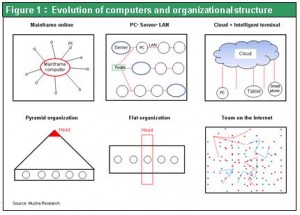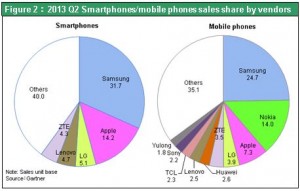Smartphones and tablets: The final configuration of electronic devices
Smartphones and tablets have absorbed a broad range of electronic devices. They have video and still cameras, audio devices, telephone and communication functions, and personal computers built-in. As a result, we have reached the point where these devices can link people worldwide via the Internet. Furthermore, smartphones and tablets are becoming a replacement for performing the intermediary role for information, finance and other items. Current media like broadcasts, newspapers and publications will probably become buried in the world of the Internet in which smartphones and tablets are used as interfaces. These devices already serve as tickets and wallets and may eventually start creating pseudo-money. Evolution of the smartphone is certain to continue with more and better functions, smaller dimensions, and more sophisticated capabilities. This is the final configuration of electronic devices. Smartphones and tablets have replaced AV devices and personal computers, but there is nothing that will subsequently replace smartphones and tablets.
New human relationships by making individuals completely self-reliant
The world that has been created by smartphones and tablets is significant in historical terms. Progress with computers altered how people interact in the economy. During the mainframe era, centralized processing produced pyramid-shaped organizations. For the PC and LAN age, companies switched to flat organizations. In today’s era of smartphones, tablets and cloud computing, there is no longer any need for a structured organization. Flexible teams made up of individuals who operate without limitations are now the fundamental form of economic activity. Never before have individuals been completely self-reliant with direct access to the components of production and to markets. The result is spontaneously formed with no restrictions. We are witnessing the greatest change since the transformation of agricultural community into corporate organizations in which salaried labor and capital were separated. Such shifts in interpersonal relationships are sparking dramatic changes in business model and costs. This will probably generate more evolution of the global economy. The United States and other developed countries have substantial amounts of surplus labor (U.S. unemployment is stubbornly remaining at the highest level of the postwar era) and capital (long-term interest rates are at historic lows in major countries and companies are not reinvesting their large profits). I believe that its greatest cause is rising productivity (labor productivity and capital productivity) fueled by the worldwide Internet, smartphone and tablet revolution.
Figure 1:Evolution of computers and organizational structure

The significance of Microsoft’s acquisition of Nokia
Microsoft’s decision to buy the mobile phone unit of Nokia clearly demonstrates the decisive importance of smartphones in the electronic device market. In the past, Nokia dominated the mobile phone market and Microsoft dominated the personal computer market. But if mobile phones and personal computers are eaten into the market for smartphones, the markets of Nokia and Microsoft may disappear just as digital cameras took over the market for film cameras. Consequently, maintaining a presence in the smartphone market will be critically important to companies in the electronics industry. There was no other option for Microsoft and Nokia.
This technological progress triggers more heated competition and transforms products and services into commodities. Prices fall sharply as a result. Moreover, there are no permanent winners. New entrants always have opportunities to provide innovative business models and services under new technological environments. Apple and Samsung both may find themselves forced into the same situation that Microsoft and Nokia are in today.
Japanese companies need to use two approaches
In Japan, companies and the public do not appear to sufficiently comprehend the importance of smartphones. In the smartphone market, Japan has ended up as a complete loser. Apple and Samsung are the big two and Chinese companies like Huawei Technologies are using their low-cost operations to capture market share. On the other hand, NEC, Panasonic and other companies have pulled out of the mobile phone market. Isn’t this an enormous problem for Japan, which is a country rooted in manufacturing?
But there is still hope for Japan. First, Japan continues to control large shares of the markets for many products. Examples include chip capacitors and SAW filters made by Murata, CCD image sensors made by Sony, SRAMs made by Toshiba, and chemical high-tech materials made by Nitto Denko and Kuraray. All these products are difficult to imitate because they are in a sense technological “black boxes.” As high-tech products increasingly become commodities, these advanced components are superior in terms of the competition for profits. A second opportunity is the potential for Japan’s hardware technologies and systems technologies to play a big role in achieving more advances with smartphones and tablets. Looking ahead, the market for these products is likely to divide into two categories: general-purpose models with low prices and high-performance, value-added models. Japan has a significant opportunity to earn profits by specializing in technologies for differentiation in the value-added sector.
Japanese companies need to focus on smartphones with the greatest possible vigor due to the outlook for growth of electronics manufacturers centered on smartphones. In addition, Japanese companies probably need to learn from the decision-making and other management processes of overseas companies, including the decision by Microsoft and Nokia to go ahead with their mobile phone business deal.
Figure 2:2013 Q2 Smartphones/mobile phones sales share by vendors




